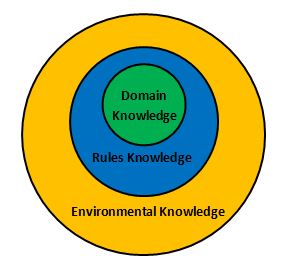Google the term “self defense” and there almost 10 million results. Millions of people expounding on different ideas of what constitutes self-defense. Google “self-defense competency” and the results drop down to a couple thousand.
What does it mean to be competent in self defense? It doesn’t mean that you are safe. You could safely lock yourself in your fortress-like home and still be incompetent in self-defense.
Self defense competency is described in many ways by different people. I define it as a competency in three separate, but inter-related and inter-dependent elements of Environmental Knowledge, Rule Knowledge, and Domain Knowledge. Where:
- Environmental Knowledge (EK) is understanding the general makeup of a location/area/place/environment. For example, what the people do, when they do it, who they do it with, why they do it, where they do it, and how they do it. Having EK means you see the environment as it truly exists, not as how you believe it to be. EK requires understanding social norms and cultural motivations. And how these desires and attitudes effect the inhabitant’s rules and behaviors. (See Marc MacYoung for the original deeper description of this concept)
- Rule Knowledge (RK) is understanding “how things work” in the specified Environment. The Environment creates the Rules. All human societies, groups, organizations, tribes, families, etc have some form of Rules of Behavior. These rules are specific to the Environment, but underlying them are universal principles and concepts (that are not so hard to understand). It is not enough to know the environment, you also need to know how the rules guide behaviors, allow people to function/work, and to reward and punish behaviors. You need to know who implements/enforces the rules, what are the rules, how the rules are communicated, how the rules are enforced, how compliance/respect for the rules is shown. Understanding the “rules” of criminal behavior is essential to RK.
- Domain Knowledge (DK) is having the knowledge and skills to deal with/operate in the specific Environment and to be capable of protecting yourself and others (within reason). It is here that understanding criminal behavior is critical. A major portion of DK is having both EK and RK. It takes EK to derive RK. It takes RK to develop the competency of DK. DK is what most people think of as “how to do self-defense”. What they don’t “see” is the underlying knowledge of when to do something, what to do, why to do it, where to do it, and against whom, or not against whom, and when it works, when it doesn’t, and what to do next.
The opposite of Self-Defense Competency is Self-Defense Incompetency. Since Self-Defense Competency requires having all three elements of EK and RK and DK, incompetency means lacking any one of the three. Most Self-Defense Incompetency stems from not having a complete understanding of Environmental Knowledge. This partial understanding leads to insufficient Rule Knowledge and incomplete or entirely defective Domain Knowledge.
Despite being the foundation of Self-Defense Competency, Environmental Knowledge frequently is assumed to be common knowledge. It is viewed as simply occurrences of Bad Guys assaulting Good Guys in some manner. Environmental Knowledge is also separate from “situational awareness”. It is not enough to simply be aware, you need to know what you are looking for, and what to be aware of.
